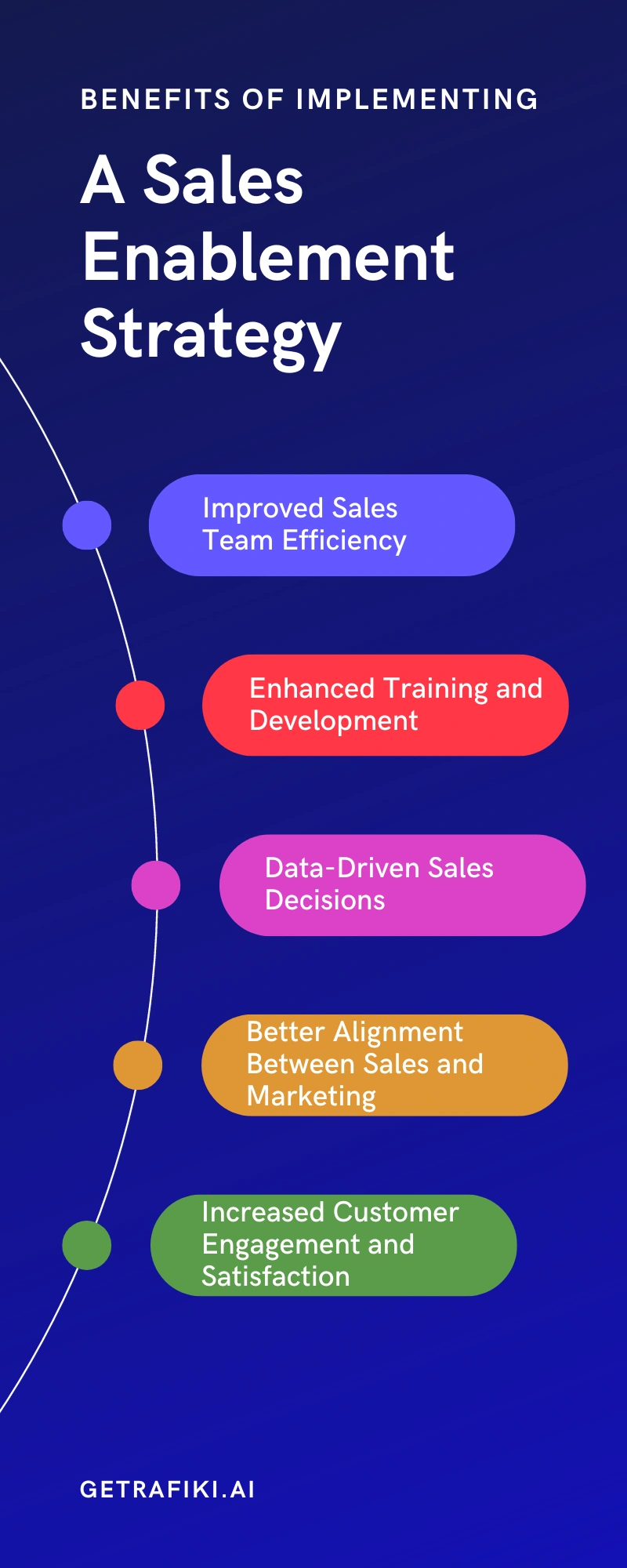Why Rafiki
Pricing


Pricing
Solutions

RevOps Leaders
Synchronize revenue generating functions

SDR Leaders
Get your team aligned and Coach your Reps 3x faster at scale

Sales Leaders
Unlock pipeline truth, drive confident forecasts

Sales enablement refers to the process of providing a sales team with the necessary tools, resources, and training to effectively engage with customers and close deals. In today's competitive business environment, implementing a sales enablement strategy can be a game-changer for organizations looking to optimize their sales process and drive revenue growth. Staying ahead of the competition is not just about having a great product or service. It’s also about ensuring your sales team is equipped with the right tools, strategies, and insights to drive effective conversations and close deals efficiently. This is where a sales enablement strategy comes into play, and Rafiki is leading the way in revolutionizing how businesses approach sales and customer interactions.
We understand that the landscape of sales and marketing is constantly evolving. Our conversation and revenue intelligence platform is designed to adapt to these changes, providing your team with the insights and tools needed to excel.
From leveraging data-driven insights to enhancing customer engagement, a robust sales enablement strategy is key to unlocking your team's potential. Join us as we delve into these benefits and demonstrate how Rafiki can be the catalyst for your sales success.
Sales enablement is a multifaceted and dynamic concept, essential in the modern landscape of sales and marketing. At its core, sales enablement focuses on equipping sales teams with a comprehensive set of resources, aimed at enhancing their ability to close more deals effectively and efficiently. These resources can vary broadly, encompassing strategies, tools, content, and materials that are customer-centric and target the right buyers. The process of sales enablement involves not only the provision of these resources but also a strong emphasis on training, coaching, and educating sales representatives. This holistic approach ensures that sales teams are well-prepared and adept at selling more effectively and rapidly.
Furthermore, sales enablement is about more than just the dissemination of resources; it's an ongoing process of improvement and adaptation. As described by Salesforce, it involves training sales representatives to not only sell but to excel at selling. This training often incorporates various methods, including coaching, providing educational content, certifications, and even organizing events such as sales kickoffs. The ultimate goal of these activities is to enable sales teams to close more deals at a faster pace, always with an eye on evaluating the effectiveness of these efforts.
Gartner highlights another critical aspect of sales enablement: its role in helping sales teams navigate the constantly changing landscape surrounding them. This change can stem from various factors, such as shifts in the buying environment, macroeconomic fluctuations, and the evolution of seller roles. Sales enablement, therefore, is not just about providing resources; it's about offering guidance and support that adapts to these changing conditions, enabling sales teams to maintain their effectiveness and relevance in a dynamic market.
In summary, sales enablement is an iterative and continuous process, as stated by HubSpot. It's about systematically providing sales teams with the necessary content, tools, knowledge, and information to effectively sell products or services. This approach is not a one-time event but a continuous cycle of providing, applying, evaluating, and refining the resources and strategies to ensure the sales team's success in a constantly evolving market.
Sales enablement is a strategic, comprehensive, and adaptive approach that focuses on enabling sales teams to perform at their best. It involves a combination of providing the right resources, continuous training and development, and adapting to the ever-changing market conditions, all aimed at maximizing the efficiency and effectiveness of sales teams.
Sales enablement plays a crucial role in fostering cross-functional alignment within an organization. By providing the necessary tools, resources, and training, sales enablement ensures that various departments, such as marketing, product development, and customer support, work together to create a seamless and effective sales process. This collaboration not only streamlines the sales process but also increases overall efficiency.
Better collaboration between departments results in a more unified approach to achieving sales goals. This unity allows for quicker problem-solving and more informed decision-making, as teams can share insights and expertise. As a result, sales teams can better engage with customers, respond to their needs, and ultimately, close more deals. By implementing a sales enablement strategy, organizations can create a cohesive sales process that benefits all departments and drives business success.
Effective sales training and coaching are essential components of a successful sales organization. Providing your sales team with the right knowledge, skills, and resources enables them to engage with customers more effectively, overcome objections, and close deals more efficiently. By investing in sales enablement, organizations can ensure that their sales reps receive the guidance and support they need to excel in their roles.
One way to achieve this is by leveraging sales enablement tools, such as Rafiki's Coaching Intelligence feature. This innovative technology allows for personalized coaching tailored to each sales rep's strengths and weaknesses. By providing actionable insights and feedback based on individual performance, sales managers can help their team members improve specific areas, leading to better overall sales performance. By implementing a sales enablement strategy, organizations can empower their sales teams with the right tools and resources to maximize their potential and drive business growth.

Customer relationship management (CRM) systems play a vital role in improving sales enablement within an organization. These systems help automate and optimize the sales process by centralizing customer information and tracking interactions between sales reps and clients. By integrating CRM systems into their sales enablement strategy, companies can create a seamless workflow that leads to better customer relationships and increased revenue.
One of the primary benefits of CRM integration is the ability to streamline and automate various aspects of the sales process. This includes tracking leads, managing contacts, and monitoring sales rep performance. With all this data at their fingertips, sales teams can make more informed decisions, prioritize their efforts, and focus on activities that drive the most significant results. Moreover, a streamlined sales process leads to improved efficiency, enabling sales reps to handle more clients and close deals more quickly.
In conclusion, integrating CRM systems into your sales enablement strategy can significantly enhance your sales process, resulting in better customer relationships and increased revenue. By leveraging the power of CRM technology, your organization can create a more efficient and effective sales team that drives business growth.
For an organization to achieve success, it is vital for sales and marketing teams to work together in a coordinated and cohesive manner. Aligning these two departments is essential to ensure a consistent message and approach in engaging with customers, generating leads, and closing sales. Sales enablement strategies play a crucial role in bridging the gap between sales and marketing departments, leading to improved communication and increased sales.
One of the primary ways sales enablement strategies help unify sales and marketing efforts is by providing both teams with access to shared resources, tools, and data. This common ground fosters better collaboration, as both teams can leverage the same insights to understand customer needs, preferences, and behaviors. By having a comprehensive understanding of the customer's journey, sales and marketing teams can create more targeted campaigns and offer tailored solutions that resonate with the target audience.
Furthermore, sales enablement strategies enable both departments to align their goals and objectives. By setting shared targets and performance metrics, sales and marketing teams can work together to achieve common business goals, ensuring that their efforts are focused on driving revenue and growth.
In summary, implementing a sales enablement strategy can significantly improve the collaboration and alignment between sales and marketing departments. By unifying their efforts, organizations can ensure a more effective and consistent approach to engaging with customers, driving sales, and achieving business success.
Sales enablement plays a critical role in boosting sales productivity and performance. By providing sales teams with the necessary tools, resources, and training, sales enablement empowers reps to engage more effectively with customers, overcome challenges, and close deals more efficiently. One of the ways to achieve this is by leveraging sales enablement tools, such as Rafiki's Smart Call Scoring.
Rafiki's Smart Call Scoring is designed to help sales reps become more efficient and effective in their sales activities. The feature automatically scores meetings based on various performance metrics, providing valuable insights and feedback to sales reps. By analyzing these scores and taking appropriate action, sales reps can focus on improving specific areas of their performance and develop more effective sales strategies. The result is a more productive sales team that can drive revenue growth and business success.
In conclusion, investing in sales enablement tools and strategies can significantly improve sales productivity and performance. By equipping your sales team with the right tools and resources, you can empower them to excel in their roles and ultimately drive your organization's growth and success.
Understanding buyer needs is an essential aspect of the of the sales process. In order to engage effectively with customers and close deals, sales representatives must have a deep understanding of their buyers' preferences, motivations, and pain points. This insight enables sales reps to present tailored solutions that address the unique needs of their customers, fostering stronger relationships and ultimately leading to increased sales.
Sales enablement strategies can significantly contribute to a better understanding of buyer needs and preferences. By providing sales teams with the necessary tools, resources, and training, sales enablement empowers reps to gain a deeper understanding of their customers. This includes access to customer data, analytics, and insights that can help sales reps identify patterns and trends in buyer behavior. With this information, sales reps can develop targeted sales strategies that resonate with their customers, resulting in more effective sales engagements and increased revenue.
In conclusion, implementing a sales enablement strategy can help sales teams gain a better understanding of their buyers, leading to stronger relationships and increased sales. By investing in the right tools and resources, organizations can empower their sales reps to engage more effectively with customers, tailor their approach to meet specific customer needs, and ultimately drive business growth and success.
In summary, implementing a sales enablement strategy can significantly improve your sales team's performance and drive business growth. The top 6 benefits of adopting such a strategy include improved collaboration and alignment between departments, enhanced sales training and coaching, streamlined sales process with CRM integration, unification of sales and marketing efforts, higher sales productivity and performance, and a better understanding of buyer needs and preferences.
By investing in sales enablement tools like Rafiki, you can equip your sales team with the necessary resources and training to excel in their roles and achieve success. As a result, your organization can enjoy increased efficiency, stronger customer relationships, and ultimately, greater revenue growth. So, consider incorporating sales enablement strategies into your business plan to help your sales team thrive and drive your organization's success.
Ready to experience these benefits for yourself? Learn more about Rafiki's innovative features, such as Smart Call Summary, Smart Follow Up, and Coaching Intelligence. Empower your sales team to excel and drive your organization's growth by signing up for a free trial of Rafiki today!